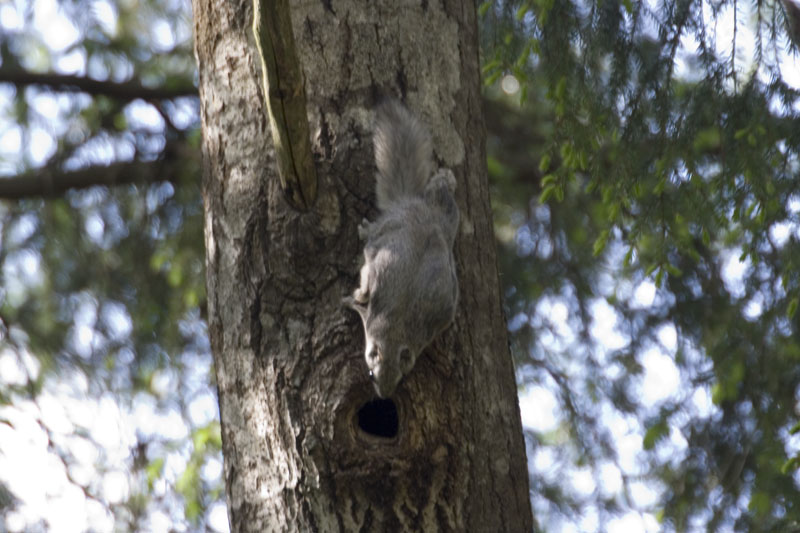|
| 질의: pteromys volans | 결과: 5번째/24 | |
Siberian Flying Squirrel (Pteromys volans) - Wiki
| 제목: | Siberian Flying Squirrel (Pteromys volans) - Wiki
| |

| 해상도: 800x533
파일크기: 97958 Bytes
등록시간: 2006:12:11 11:32:44
|
Siberian Flying Squirrel
From Wikipedia, the free encyclopedia
[Photo] Pteromys volans flying squirrel going back into nest. Picture taken in Tampere, Finland. 2006-06-01. Credit: Marko Schrader (Liito-orava).
The Siberian flying squirrel (Pteromys volans) is an Old World flying squirrel with a range from western Finland and the Baltic states to the Pacific coast. It is the only species of flying squirrel found in Europe, and is considered vulnerable within the European union.
A female Siberian flying squirrel weighs about 150 grams, the males being slightly smaller on average. The body is 13???20 cm long, with a 9???14 cm long flattened tail. The eyes are large and strikingly black. The coat is gray all over, the abdomen being slightly lighter than the back, with a black stripe between the neck and the forelimb. A distinctive feature of flying squirrels is the furry glide membrane or patagium, a flap of skin that stretches between the front and rear legs. By spreading this membrane the flying squirrel may glide from tree to tree across distances of over a hundred meters.
The diet of a Siberian flying squirrel consists of leaves, seeds, buds, sprouts, nuts, berries and occasionally bird eggs and nestlings. When alder and birch catkins are plentiful, the squirrel may store them for the winter in old woodpecker holes or similar nooks.
Siberian flying squirrels mate early in the spring. In southern Finland the first mating season begins in late March, with a second mating season occurring in April. After a gestation period of five weeks, the female gives birth to a litter of usually two or three young, each weighing about 5 grams. Siberian Flying Squirrels preferentially build their nest in holes made by woodpeckers, but they may also nest in birdhouses if the size of the entrance is appropriate. The nest consists of a pile of soft materials (preferably soft beard lichen) into which the squirrel burrows. A Siberian flying squirrel can live up to about five years.
Siberian flying squirrels favor old forests with a mix of conifers and deciduous trees. They are mostly nocturnal, being most active late in the evening, although females with young may also feed during the day. Siberian flying squirrels do not hibernate, but in the winter they may sometimes sleep continuously for several days. As shy and nocturnal animals, Siberian flying squirrels are seldom seen. The most common sign of their presence are their droppings, which resemble orange-yellow rice grains and are often found beneath or on top of their nest.
Order: Rodentia
Family: Sciuridae
Genus: Pteromys
Species: Pteromys volans (Linnaeus, 1758)
Synonyms: Sciurus volans Linnaeus, 1758
http://en.wikipedia.org/wiki/Siberian_Flying_Squirrel
| The text in this page is based on the copyrighted Wikipedia article shown in above URL. It is used under the GNU Free Documentation License. You may redistribute it, verbatim or modified, providing that you comply with the terms of the GFDL. |
|
^o^
동물그림창고 똑똑전화 누리집
^o^
|
|